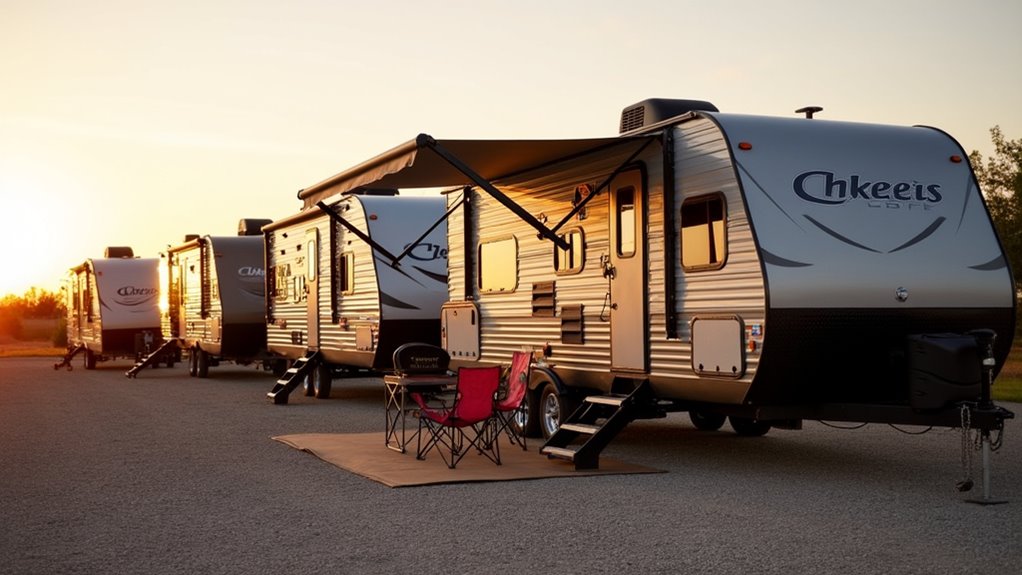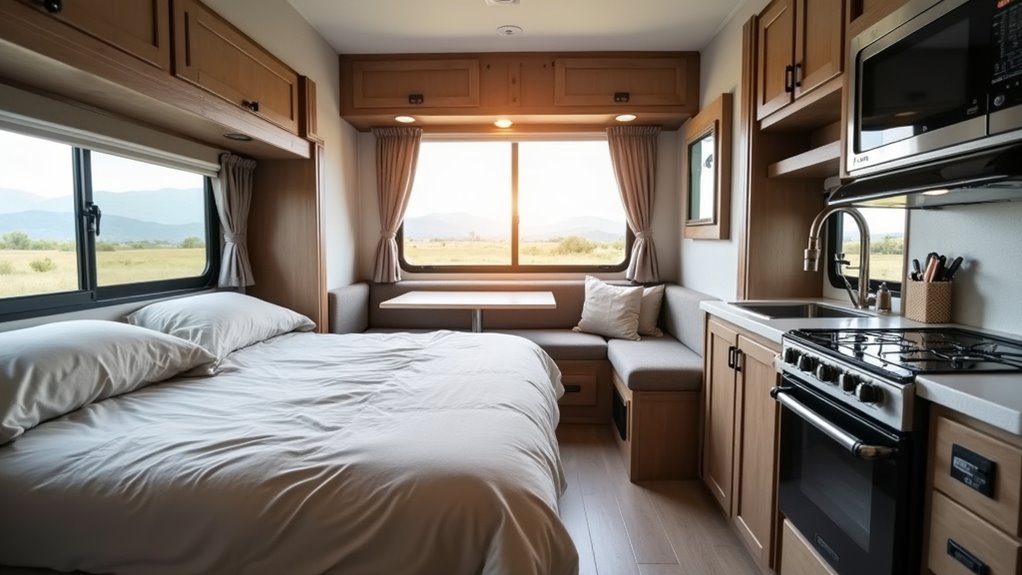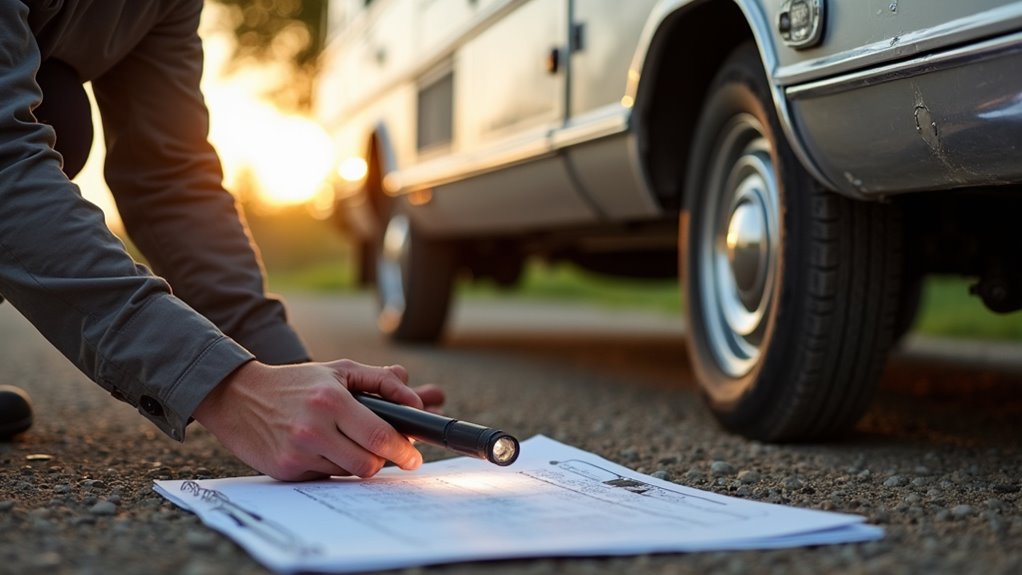Physical Address
304 North Cardinal St.
Dorchester Center, MA 02124
Physical Address
304 North Cardinal St.
Dorchester Center, MA 02124

Avoid costly camping trailer mistakes with these six expert tips that transform your search from overwhelming to empowering.
Is it true that choosing the perfect camping trailer requires more than just picking the one that looks best on the lot? You’ll need to take into account various factors that can greatly impact both your travel experience and your wallet. From matching your vehicle’s towing capacity to understanding different floor plans and amenities, the selection process might seem overwhelming at first. Let’s explore six practical ways to narrow down your options and find the ideal trailer for your outdoor adventures.

Before diving into the perfect camping trailer purchase, you’ll need to carefully assess both your camping style and financial boundaries.
Consider how often you’ll camp, where you’ll travel, and what activities you’ll pursue. If you’re a frequent camper tackling rugged terrain, you’ll want a durable trailer with off-grid capabilities, while occasional campers might prefer simpler options. Some outdoor enthusiasts choose a toy hauler garage to transport their recreational vehicles and equipment.
Your budget will greatly influence your choices. While fifth wheels offer luxury and space, they come with higher purchase prices and insurance costs. RV Camping is Better than Tent Camping, as it provides more amenities and comfort.
If you’re budget-conscious, consider a basic travel trailer that balances essential amenities with cost-effectiveness.
Don’t forget to factor in ongoing expenses like maintenance and fuel efficiency. For example, motorhomes typically consume more fuel and require more maintenance than conventional trailers, impacting your long-term costs.
Now that you’ve determined your camping needs and budget, selecting the right trailer size and weight becomes your next major decision.
Start by checking your vehicle’s towing capacity, as this will set firm limits on your options. Most half-ton trucks and large SUVs can safely handle trailers between 3,500 and 6,000 pounds.
Always verify your vehicle’s towing capacity first – it’s the make-or-break factor in choosing the right travel trailer.
Consider that travel trailers range from 12 to 35 feet in length and typically weigh between 1,100 and 8,500 pounds unloaded. Floor plan options can significantly impact your choice based on your space requirements and desired amenities. RV Camping or Tent Camping: Which Is Right for You can also help you determine the appropriate trailer size.
You’ll need to factor in about 400 pounds for camping gear and supplies, plus any additional equipment like generators.
Don’t forget to measure your storage space at home – typical widths of 6 to 8 feet and varying heights must fit your garage or parking area.
Getting accurate measurements and weights is essential to guarantee safe towing and prevent costly mistakes.

When choosing your ideal camping trailer, understanding essential features and amenities will help you maximize both comfort and functionality.
Look for ample storage solutions, including built-in cabinets, under-bed compartments, and exterior pass-through storage for dirty gear. You’ll want a well-designed interior layout with defined living spaces and panoramic windows to create openness. A dedicated workstation with cellular signal boosters enables remote work capabilities. Essential camping furniture can enhance your outdoor adventures.
Guarantee your trailer includes essential kitchen features like a cooktop, refrigerator, and adequate counter space.
Don’t overlook sleeping accommodations – a quality memory foam mattress and proper insulation make a significant difference in comfort.
Consider practical utilities such as outdoor showers, stabilizer jacks, and solar panel compatibility for off-grid adventures.
Exterior lighting and awnings will extend your living space outdoors, while durable construction materials ensure long-term value.
Safe and legal towing requires thorough knowledge of both federal and state regulations to protect yourself and others on the road.
You’ll need to understand weight ratings, licensing requirements, and safety equipment standards before hitting the road with your camping trailer.
Essential towing safety measures include:
Always check your state’s specific requirements for additional compliance measures. Drivers should be aware that leftmost lane restrictions may apply when towing trailers on highways in certain states. Plus, essential RV camping tips can help ensure a safe and enjoyable camping experience.

Three critical aspects of camping trailer ownership revolve around thorough inspection, preventive maintenance, and timely repairs.
You’ll need essential tools like a flashlight, tire pressure gauge, and multimeter to conduct regular checks. Don’t forget your toolbox with basic repair items for quick fixes.
Start your inspection from the outside, examining body panels for damage, checking seals around windows and doors, and testing all exterior lights. For extensive issues discovered during inspection, hiring professional help can provide crucial expertise about necessary repairs and associated costs. Choosing a camping trailer with durable construction and reliable components can help minimize the need for repairs.
Inside, inspect floors for soft spots, test electrical systems, and guarantee cabinets and furniture operate properly. Pay special attention to plumbing, testing all water connections and checking for leaks.
Maintain weatherproofing by regularly inspecting seals and caulking. Check tire condition, suspension components, and guarantee all accessories are functional.
Document any issues with photos and notes for future reference.
Before investing in a camping trailer, you’ll need to thoroughly research both established and emerging brands while carefully considering total ownership costs. Focus on manufacturers with proven track records like Airstream, Oliver Travel Trailers, and Grand Design RV, which consistently deliver quality and maintain strong resale values.
Consider brands like Opus Camper for specialized needs such as off-road capabilities or expandable features. Many leading manufacturers offer a diverse range of RVs to accommodate different camping styles and preferences.
Ready to commence your camping trailer journey but feeling overwhelmed by the choices? By following these six essential steps, you’ll find the perfect trailer that matches your camping style and budget. Don’t forget to prioritize safety, size requirements, and long-term maintenance costs. With careful research and attention to detail, you’ll make a smart investment that delivers years of memorable outdoor adventures without breaking the bank.